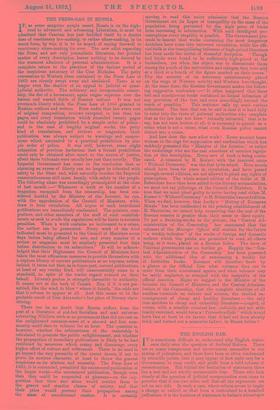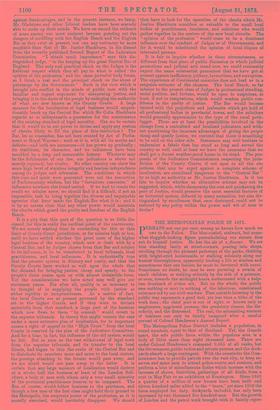THE ENGLISH BAR.
I T is sometimes difficult to understand why English states- men daily over the question of Judicial Reform. There are so many conspicuous and inconvenient anomalies in our system of judicature, and these have been so often condemned by scientific jurists, that it may appear at first sight easy for a Government to reap credit and profit from a bold scheme of reconstruction. But behind the hesitation of statesmen there lies a real and not wholly unreasonable fear. Those who look closely at the question of judicial reorganization soon come to perceive that it has two sides, and that all the arguments are not on one side. In such a case, where reform seems to imply a change so radical as that from a centralised to a localised judicature, it is the business of statesmen to balance advantages
against disadvantages, and in the present instance, we fancy, Mr. Gladstone and other Liberal leaders have been scarcely able to make up their minds. We have on record the evidence of some among our most eminent lawyers pointing out the dangers of meddling with the English Bench and the English Bar as they exist at present, nor can any testimony be more emphatic than that of Mr. Justice Blackburn, in his dissent from the recently published Second Report of the Judicature Commission. "I attach much importance," says this dis- tinguished judge, "to the keeping up the great Central Bar of England. The only real practical check on the Judges is the habitual respect which they all pay to what is called the opinion of the profession,' and the same powerful body forms, as I think, a real and the principal check on the abuse of patronage by the Government." Such is the view which is brought into conflict in the minds of public men with the familiar and cogent argument for cheapening justice, and bringing it to the doors of the people by enlarging the authority of what are now known as the County Courts. A large measure for the localisation of legal business would unques- tionably break up the Central Bar which Sir Colin Blackburn regards as so indispensable a guarantee for the maintenance of the existing standard of legal morality. Can we be certain that it would be in our power to devise and apply any system of checks likely to fill the place of this institution ? The Bar, let us remember, has not been created by Act of Parlia- ment or Royal Warrant ; such as it is, with all its merits and defects—and both are numerous—it has grown up gradually ; its traditions, its character, and its influences have been moulded by a long and memorable history. Whatever may he the deficiencies of our law, our judicature is above not merely reproach, but rivalry. No other country can show the same high level of stainless integrity and fearless independence among its judges and advocates. The conditions in which this tone, and spirit were generated were not the concoction of Parliamentary wisdom, but the "fortuitous concourse" of influences nowhere else found united. If we had to create the result we admire anew, we should find it a difficult, if not an impossible, task to bring together the diverse and impalpable agencies that have made the English Bar what it is ; and it is by no means clear that any other power would maintain the checks which guard the purity and freedom of the English Bench.
It is a pity that this part of the question is so little dis- cussed, for this is really the cardinal point of the controversy. We are merely wasting time in contending for this or that limit of County-Court jurisdiction, or for salaries high or low, until we have settled whether the great mass of the higher legal business of the country, which now is dealt with by a Central Bar, and by Judges chosen from that Bar and subject to its influence, is to be transferred to local tribunals, local practitioners, and local influences. It is undoubtedly true that the present system is dilatory and costly, and that the County Courts have worked so well upon the whole that the demand for bringing justice, cheap and speedy, to the people's doors comes upon us with almost irresistible force. Yet the considerations we have noted may well give our statesmen pause. For after all, quality is as necessary to be thought of in supplying the people with justice as either rapidity or inexpensiveness. As a matter of fact, the local Courts are at present governed by the standard set in the higher Courts, and if they were to deviate materially from that standard, a large part of the business which now flows to them "by consent" would revert to the superior tribunals. In theory this might remain the case under a more extensive plan of localisation, for in important causes a right of appeal to the "High Court" from the local Courts is reserved by the plan of the Judicature Committee. And for a time, in fact, the influence of the old system would be felt. But as soon as the vast withdrawal of legal work from the superior tribunals, and its transfer to the local Courts, had begun to thin the ranks of the Central Bar and to distribute its members more and more to the local centres, the prestige attaching to the former would pass away, and we are afraid would not pass away to the latter. It is certain that any large measure of localisation would destroy at a stroke half the business at least of the London Soli- citors, a body of men with whom only a very small minority of the provincial practitioners deserve to be compared. The Bar, of course, would follow business to the provinces, and though a few men of the first class might hold their ground in the Metropolis, the corporate power of the profession, as it is morally exercised, would inevitably disappear. We should then have to look for the operation of the checks which Mr. Justice Blackburn considers so valuable to the small local bodies of practitioners, barristers, and solicitors who would gather together in the centres of the new local circuits. The "opinion of the profession" would cease to be a dominant influence over the conduct of Judges or of Governments, and for it would be substituted the opinion of local cliques of interested persons.
It is fair to inquire whether in these circumstances, so different from that glare of public discussion in which judicial promotions and judicial acts stand now, we could reasonably expect the same substantial guarantees that we have got at present against inefficiency, jobbery, favouritism, and corruption. The experience of Continental countries does not lead us to a sanguine estimate of the chances. The local Bench, so far inferior to the present class of Judges in professional standing, social position, and fortune, would be open to suspicions, at least, if not to temptations, which would weaken public con- fidence in the purity of justice. The Bar would become tainted with the prejudices and jealousies which get hold of all professional bodies in provincial towns, and the solicitors would generally approximate to the type of the rural petti- fogger. These are at least the possibilities involved in the change from a centralised and localised judicature, and with- out questioning the immense advantages of giving the people cheap and speedy justice, we contend that there is something to be said on the other side. Statesmen may well hesitate to undermine a fabric that has stood so long and served the country so well, until at least we have the assurance that we shall get a decent weather-proof house in its stead. The pro- posals of the Judicature Commissioners respecting the juris- diction of the County Courts, if not open to all the ob- jections that may be urged against a complete scheme of localisation, are considered dangerous to the "Central Bar" by so high an authority as Mr. Justice Blackburn. Is it too late to inquire whether an alternative scheme may not be suggested, which, while cheapening the cost and quickening the pace of Justice, would preserve the most essential features of an historical system, defaced by many anomalies, but also dis- tinguished by excellences that, once destroyed, could not be restored by any policy within the power and wit of man to devise ?



































 Previous page
Previous page